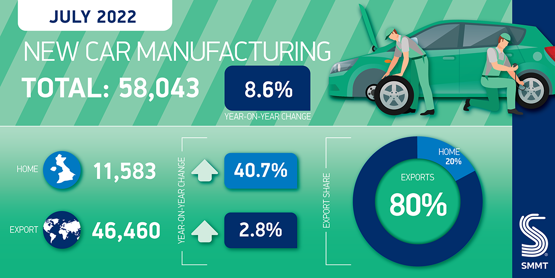Motor manufacturing calling for essential support
SMMT calls on new Prime Minister for immediate action
The motor industry needs urgent help from the government.
That’s the view from the Society of Motor Manufacturers and Traders (SMMT). According to Mike Hawes, chief executive, the new Prime Minister will put jobs and economic growth at risk unless fast, focussed action is taken to mitigate against soaring costs.
Hawes warns of the threat from growing economic headwinds despite a third consecutive rise in car manufacturing volumes in the UK during July.
Ups and downs
Output rose 8.6% year-on-year to 58,043 units, but remained just 4,605 units ahead of a period which proved to be the sector’s worst performing July since 1956.
Year-to-date, volumes remain 16.5% down (at 461,174) and a sizeable 46.4% below pre-pandemic levels, the SMMT said.
“A third consecutive month of growth for UK car production is, of course, welcome,” states Hawes,. It hopefully signals improvements to the supply chain issues.
“But other challenges remain, not least energy costs which are increasing at alarming rates. If we are to attract much needed investment to drive the production of zero emission vehicles, urgent action is needed to mitigate these costs to make the UK more competitive for manufacturing.
“This must be a priority for the next Prime Minister else we will fall further behind our global rivals, risking jobs and economic growth.”
Compounding costs
Richard Peberdy, UK head of automotive at KPMG, is also calling for help. It comes as rising energy prices push up production costs and the cost-of-living crisis threatens consumer demand .
“Rising energy, supply, and labour costs are driving up the cost of car production at a time when many consumers are applying the brakes to their spending plans,” said Peberdy.
“Owing to ongoing supply issues, demand still outweighs supply, but this isn’t a save-all for the challenges that the sector faces.
Government needs to support the competitiveness of the industry over the coming months, “particularly as it looks to seize electric vehicle market share globally.”

SMMT data showed that production for the UK market grew by 40.7%. Exports, which account for one-in-10 cars produced by UK factories, is up by a more modest 2.8%.
Orders from China and Japan drove the export growth, rising 54% and 40.1%. However, exports to the EU and US declined 7.3% and 22.8%.
Almost a third (29.9%) of cars produced in July were electric vehicles (EV), plug-in hybrids (PHEV) or hybrid electric (HEV).
Fingers crossed
Positive production figures are a welcome boost in the face of difficult economic times. However, the semi-conductor shortage continues. However, it is easing with Renault and Stellantis expecting to return to normal production following their summer break.
However, the Felixstowe strikes amongst other stoppages, and the ongoing war in Ukraine with its effects on the cost of living and energy crisis continue to hinder progress. Following on the back of the pandemic, industry and infrastructure are creaking and customer confidence is low.
With demands willing up the inbox of the ‘zombie’ government, plus the increasing bad feelings with the biggest export market the EU following Brexit, the new Prime Minister has an unenviable initiation into their new role.





